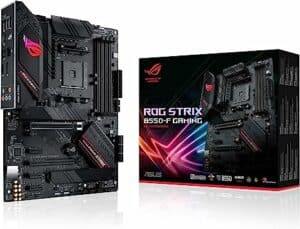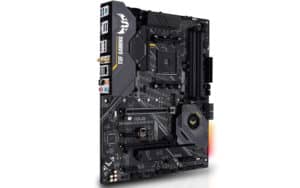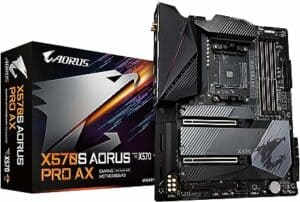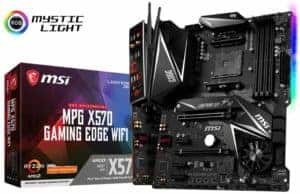Best motherboard for Ryzen 7 5700G – for budget, high-end, overclocking
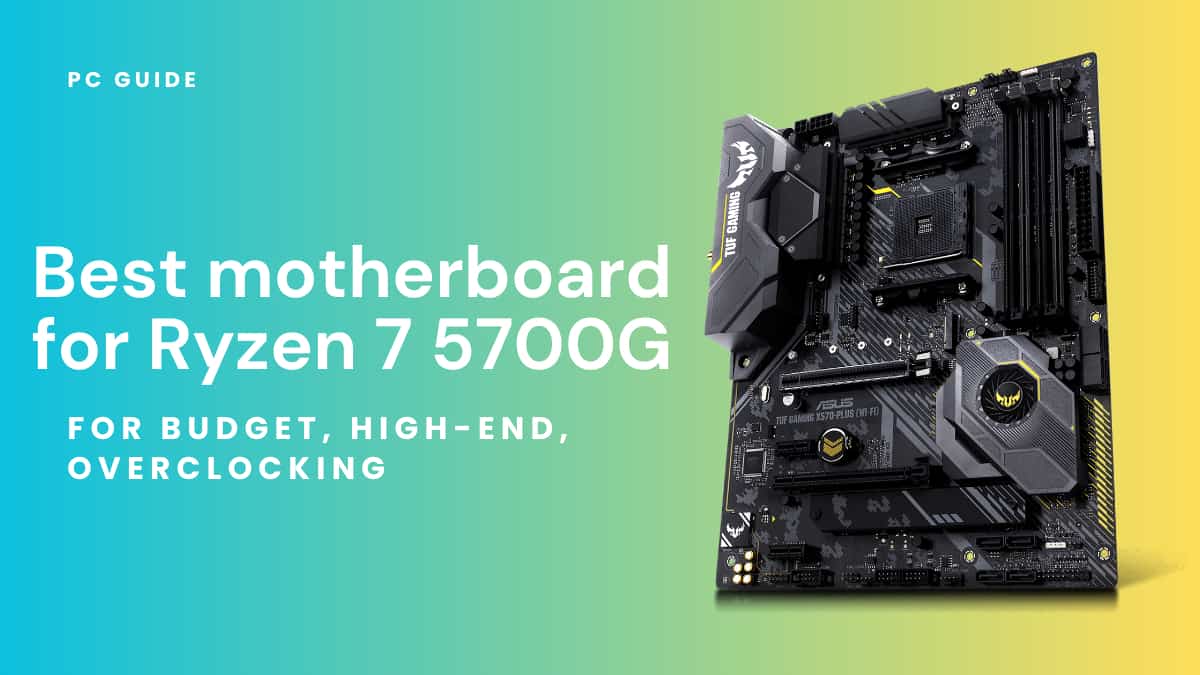
Table of Contents
As AMD continues its march in the CPU market, the Ryzen 7 5700G emerges as one of its most promising offerings. For those planning to harness the power of this chip in tandem with a valiant graphics card, selecting the best motherboard for the AMD Ryzen 7 5700G becomes an essential task. The mobo not only forms the backbone of your PC but also determines its future expandability and compatibility with other components.
Products at a Glance
How we picked the best motherboard for the Ryzen 7 5700G
The process of selecting the top motherboard entails a comprehensive analysis of the available options in the market. By taking into account factors such as VRM quality, RAM compatibility, expansion options, and user reviews, a shortlist is curated.
Moreover, personal preferences also play a significant role. Some users might prioritize aesthetics, seeking RGB lighting or a particular board color, while others might prioritize connectivity options or overall value. By blending technical specifications with user preferences, we aim to provide a balanced perspective, ensuring that the recommended motherboards align with a wide array of needs and preferences.
Though, maybe you’d prefer to go with Team Blue instead of AMD? Luckily, we’ve got a handy guide that covers the best motherboards for Intel Core i7-12700K. With that powerful mobo, you’ll need an equally strong GPU to match, which can be found in our guide for the best GPUs for the Core i7-12700K.
Product Reviews
- Cable identification stickers
- Incredible performance
- Superior cooling with fan control
- Easy setup
- No onboard measuring points
- No clear CMOS or reset buttons
This ATX motherboard from Asus is at the top of the list due in large part to its swath of features, like stable overclocking, incredible onboard cooling, cable identification stickers, and so much more. The ASUS Rog Strix B550-XE, leveraging the AM4 socket, remains one of the best options to pair alongside your Ryzen 7 5700G.
While a bit more expensive than the Asus ROG Strix B550-F, which also sports an AM4 socket, the B550-XE still remains superior. The board has DDR4-Sdram support with two M.2 slots, one of which is PCIe 4.0, and a custom Delta Superflo fan for unrivaled cooling.
The BIOS menu is also incredibly sophisticated, allowing users to configure storage devices and onboard audio and Wi-Fi controllers. This is a gaming motherboard that doesn’t break the bank and stands tall over rivals like the MSI MAG B550 Tomahawk.
- Built for overclocking
- Sturdy TUF build quality
- Comprehensive connectivity options
- Might be overkill for casual users
- Pricey compared to other X570s
- Some might find the design too industrial
The ASUS TUF X570-Plus Wi-Fi exemplifies the durability and performance we’ve come to expect from the TUF series. A solid VRM setup, PCIe 4.0 support, and Wi-Fi 6 integration make it a strong contender, especially if you’re planning to push your Ryzen 7 5700G to its limits.
Now, for the overclocking aficionados, the TUF X570-Plus is an absolute gem. ASUS has designed it with robust power delivery and enhanced cooling, ensuring stability even under heavy overclocking scenarios. The board doesn’t skimp on connectivity options either, with ample USB ports and top-notch audio features adding to the user experience.
While not the cheapest option on the market, the TUF X570-Plus Wi-Fi delivers where it matters most. It’s a powerhouse in its own right, suitable for those who are a bit more adventurous with their system configurations and aren’t afraid to squeeze every ounce of performance out of their setups.
- Powerful 14+2 phase VRM design
- Expansive memory and storage options
- Dual 2.5G LAN for faster networking
- Hefty price tag
- Might be challenging to fit in compact cases
- Potential BIOS hiccups for some users
Diving into the high-end spectrum, Gigabyte’s X570S Aorus AX is not just a motherboard but a statement of what performance and luxury combined can look like. Rocking the AMD X570S chipset, it’s crafted with a 14+2 phase power delivery to ensure your Ryzen 7 5700G runs like a dream.
Gamers and heavy multitaskers, this one’s got your name written all over it. Imagine running games with the highest graphical settings while having multiple tabs and programs open.
That’s possible, thanks to its capacity to handle up to 128GB of memory and its range of PCIe slots.
The dual 2.5G LAN is another lovely touch, letting you experience smoother online gaming and rapid data transfers. Sure, it’s a pricier option, but it’s about getting the crests and troughs of performance and making every cent count.
- Pre-installed I/O shield
- Speeds up to 433 Mbps
- Simple set up
- Budget friendly
- No fan connectors
- Not the best chipset fan
- No WiFi or Bluetooth
The MSI MPG X570 Gaming Edge is a well-rounded motherboard built for those on a bit of a budget. The board comes in at a little under $300 on Amazon and can be found for less at alternative stores, making it quite a steal, especially when paired with the cheaper 5th gen processor.
While the model doesn’t come with WiFi or Bluetooth, it still provides an excellent foundation for one’s 5700G build. It does come equipped with dedicated cooling for the chipset and even the M.2 SSD heatsinks.
This is not only a good motherboard, but a great choice for those aiming to spend less on their overall rig. It may not have any flashy features or an RGB header, but it serves as a valiant ATX motherboard for AMD users.
Features and considerations
When choosing a motherboard for the Ryzen 7 5700G, it’s vital to consider the chipset’s compatibility. While B450, B550, X470, and X570 chipsets support the Ryzen 5000 series processors, newer chipsets like B550 and X570 come with enhanced features like PCIe 4.0 support and better VRM designs, ensuring smoother performance and future-proofing. Additionally, these boards often offer better RAM compatibility and speed, a crucial factor for those wanting to tap into the 5700G’s potential.
Another important consideration is the motherboard’s form factor and expansion capabilities. Depending on the build’s intended purpose, users might prefer an ATX form factor for more expansion slots and features, or mini-ITX and mATX for compact builds. Integrated Wi-Fi, USB Type-C connectivity, and robust audio solutions are other features that might tip the scales when making a decision.
FAQ
Is B450 motherboard good for Ryzen 7 5700G?
For basic tasks and light gaming, a B450 should suffice. However, for those looking to leverage the full potential of the Ryzen 7 5700G or planning significant future upgrades, it might be wise to consider newer chipset options. B450 boards were primarily designed for earlier Ryzen generations, so they might lack some features or optimizations present in B550 or X570 chipsets.
Our Verdict
In the vast world of motherboards, choosing the right one for your Ryzen 7 5700G can be quite a task. But as our deep dive has shown, the landscape is filled with a mix of high-performance, budget-friendly, and specialty boards, each tailored to cater to specific user needs.
Whether you’re an overclocking enthusiast, a gamer hunting for the best visual experiences, or someone on a tight budget but unwilling to compromise on essential features, there’s a motherboard out there perfectly suited to your needs. Remember, while the motherboard serves as the foundation of your build, it’s essential to ensure that it not only supports your current components but also offers a pathway for potential future upgrades.

